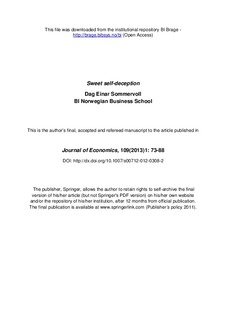| dc.contributor.author | Sommervoll, Dag Einar | |
| dc.date.accessioned | 2013-05-07T08:44:16Z | |
| dc.date.available | 2013-10-01T23:00:23Z | |
| dc.date.issued | 2013 | |
| dc.identifier.issn | 1617-7134 | |
| dc.identifier.uri | http://hdl.handle.net/11250/93930 | |
| dc.description | The final publication is available at www.springerlink.com | no_NO |
| dc.description.abstract | People have a tendency to procrastinate when faced with aversive tasks - but they also procrastinate in relation to beneficial matters whose rewards are instantaneous. If agents value present anticipations of future consumption, revision of consumption plans may be viewed as a benign form of self-deception. We consider a minimal generalization of the Samuelson discounted utility model to allow for utility linked to next period consumption. Agents are assumed to vary with respect to their sophistication. In this context, commitment and self-control are obstacles to the pursuit of increased utility. We also examine different environments that are likely to facilitate repeated revisions. | no_NO |
| dc.language.iso | eng | no_NO |
| dc.publisher | Springer | no_NO |
| dc.subject | Intertemporal choice | no_NO |
| dc.subject | self-deception | no_NO |
| dc.subject | time inconsistency | no_NO |
| dc.subject | naivete | no_NO |
| dc.subject | self-control | no_NO |
| dc.subject | discounted utility functions | no_NO |
| dc.subject | anticipation | no_NO |
| dc.subject | memory | no_NO |
| dc.title | Sweet self-deception | no_NO |
| dc.type | Journal article | no_NO |
| dc.type | Peer reviewed | no_NO |
| dc.source.pagenumber | 73-88 | no_NO |
| dc.source.volume | 109 | no_NO |
| dc.source.journal | Journal of Economics | no_NO |
| dc.source.issue | 1 | no_NO |
| dc.identifier.doi | 10.1007/s00712-012-0308-2 | |
